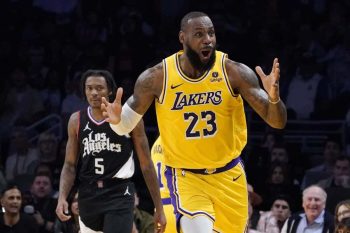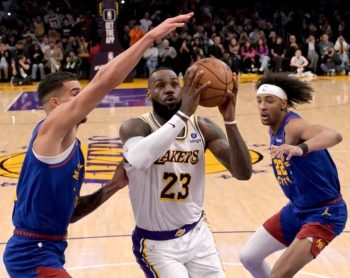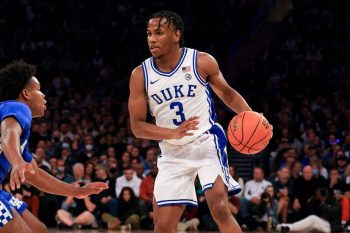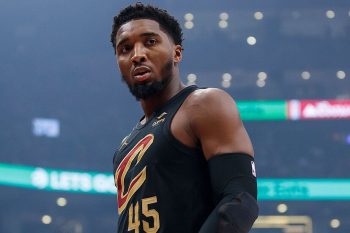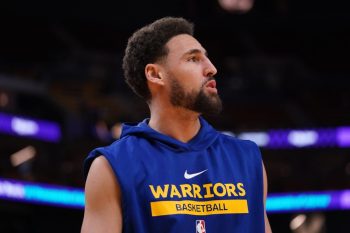NBA
Ben Dowsett’s 2015-16 Preseason Award Ballot

NBA basketball is back! Let’s all let that sink in for just a moment.
That was refreshing. While they might technically be a couple days late (the raw picks themselves can be found on Twitter for any doubting their legitimacy), here are one writer’s predictions for who will take home the hardware for the league’s biggest awards at the end of the year.
Most Improved Player: Bradley Beal, Washington Wizards
In a perfect world, high lottery picks like Beal wouldn’t be eligible for this award. They’re selected so early because their potential has clearly indicated the possibility that they become a star-level player, and it ideally shouldn’t be a cause for celebration when one excels at a high level.
This is far from a perfect world, though, and voters have no such limitations on who their choice can be. And because many high picks still take a few years to come into their own and this award is typically given to guys who show a rapid improvement from one year to the next, they are commonly candidates. Beal seems like an idea potential selection given what we know about voter history.
He’s been good in his first three seasons, but hasn’t quite reached the level his pedigree would suggest. A strong shooter and above average defender with the size to check both guard spots, Beal is primed to break out in his age-22 season. Washington coach Randy Wittman has shown a willingness to stick with a progressive system that propelled the Wizards to some unexpected success last postseason, and Beal could be the primary beneficiary. The Wizards will downsize more often and emphasize spacing more than previous Wittman groups; Beal’s 40-plus percent from deep the last couple years is set to thrive. He’s about as young as a player could be entering his fourth year in the league, and he may even have another physical level or two in him.
Sixth Man of the Year: Isaiah Thomas, Boston Celtics
Not a surprising selection by any means, Thomas might be the consensus preseason favorite with mainstays like Manu Ginobili and Jamal Crawford well past their primes and no longer serious candidates.
Thomas, meanwhile, likely would have won the award last season if his trade to Boston had come a few months earlier. He was a spark plug for the Celtics off the bench in his 21 games, a big part of the team’s late-season run. He’s really the prototypical sixth man – a speed demon who needs the ball in his hands as often as possible, but can create offense out of thin air with his whirlwind game. His 36 percent career mark from three isn’t spectacular, but is easily enough to keep defenders honest enough to allow him to fly by them and create problems everywhere.
There are other potential candidates, but none with what would appear to be such a well-carved role on a team that needs their production the way the Celtics need Thomas’. Barring injury, he’ll at least be on the voter short list come April.
Coach of the Year: Billy Donovan, Oklahoma City Thunder
Steve Kerr didn’t win the award last year, but in finishing second he showcased what’s often the simplest template to it. Kerr stepped into a team that already had elite talent on the roster, but removed a few of the silly roadblocks his predecessor had put in the way of their success. By untangling a few knots in the right places and immediately proving himself elite at a tactical level, Kerr nearly took home the hardware.
He was only beaten by the coach of a team that exceeded their preseason win expectation by as many as 20 wins (depending on which set of projections you look at), and that sort of thing doesn’t happen every year. This would leave the door wide open for a guy like Donovan, who steps into a situation with several similarities and has a chance to have a very similar effect.
Donovan should iron out a few of the kinks from a Scott Brooks offense that, while not awful, didn’t quite well enough utilize the unique talent the Thunder have on their roster. He’ll institute just a bit more structure and purpose to properly maximize Kevin Durant and Russell Westbrook, and already appears to have the suction with the front office to commit to personnel decisions like bringing Enes Kanter off the bench. The Thunder look to be extremely focused under his guidance thus far, and if they’re among the West’s elite later in the year, expect Donovan to be at or near the top of most lists.
Rookie of the Year: Mario Hezonja, Orlando Magic
Narrative plays as big a role in Rookie of the Year voting as any of the awards on the list, if not more, and Hezonja has that going for him all day long. He’s a brash European kid with elite NBA skills already developed at just 20 years old, plus the fire and confidence to inspire even more of a cult following than he already has among NBA die-hards.
Minutes can sometimes be the deciding factor for this award, as they’ll vary pretty wildly among many rookies, but that shouldn’t be an issue for Hezonja. He logged 25 minutes in Orlando’s opener off the bench, and coach Scott Skiles even said he gave real consideration to starting him. It’s hard to see his volume dropping as the year goes on.
Defensive Player of the Year: Anthony Davis, New Orleans Pelicans
If this column was about picking which player should win this honor, it’d be a different name. Thing is, though, voters have proven that what should happen often doesn’t when it comes to these awards. Narrative and timing are just too big a factor.
Davis is a great defensive player, and will likely deserve at least one DPOY before he’s hung it up. This year, though, some portion of his votes will undoubtedly come from voters who couldn’t quite bring themselves to vote for him for the big award, MVP, and compensated by giving him the only other one for which he’ll realistically qualify. This might sound crazy, but it absolutely happens all the time – many voters see at least one or two secondary awards as a chance to compensate a guy who may have deserved MVP or another top honor but missed out. It’s not out of the question that Davis earns himself the award on merit alone, but if he’s anywhere close expect name value and narrative to carry him.
Most Valuable Player: Kevin Durant, Oklahoma City Thunder
It’s easy to forget that the last time Durant played a full season, he produced at a level of combined volume and efficiency that had virtually never been seen before. Smack dab in his physical prime, and in a year that will define his career, look for him to push those boundaries even further.
With Donovan in town to open things up just a little bit more and the Thunder as strong offensively as they’ve ever been, Durant should be at peak form if he can avoid any lingering effects from his injuries. Serge Ibaka is a legitimate threat from three-point range, and Donovan won’t be as stubborn as Brooks about pulling guys like Andre Roberson when they need an offensive jolt. Lineups featuring Durant with Ibaka, Russell Westbrook and Anthony Morrow will be a literal nightmare for opposing defenses.
Durant will be the primary beneficiary. He’s exceeded 40 percent from deep three times in his career; mark it down, this will be the fourth. Also, look for a potential career high in assists after he fell off a bit here last year; it just won’t be possible for teams to contain Durant while staying home everywhere against many of these Thunder lineups. He won’t even need the 32 points per game he averaged in his last MVP season, but don’t be surprised to see him push 30 again. The Thunder will be at or near the top of the West’s standings, always a must for any realistic MVP candidate, and this one may end up as less of a contest than most expected coming into the year.

